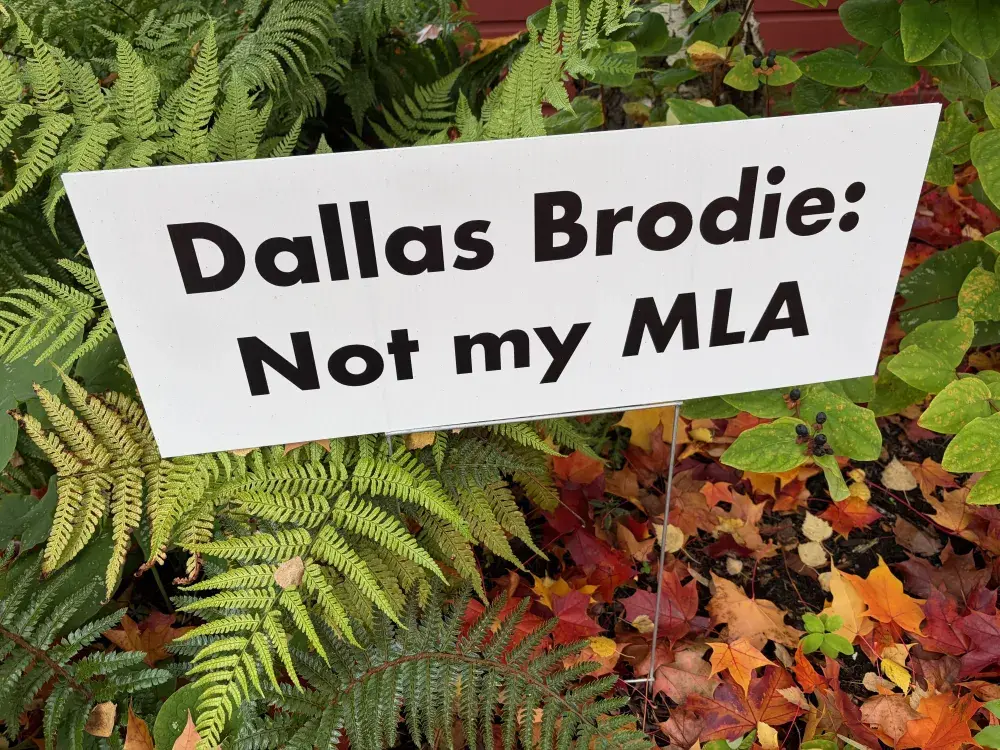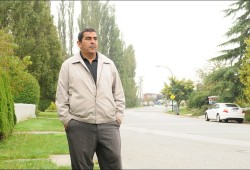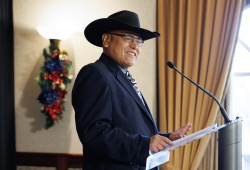This November B.C. MLAs punted into oblivion a pair of private members’ bills concerning First Nations.
On Nov. 19, Independent MLA for Peace River North Jordan Kealy put forward the Declaration on the Rights of Indigenous Peoples Statute Repeal Act. His bill was blocked from advancing by a vote of 48-43.
On Nov. 20, OneBC MLA for Vancouver-Quilchena Dallas Brodie pitched the National Day for Truth and Reconciliation Statute Repeal Act, which introduced a motion to repeal the National Day for Truth and Reconciliation as a provincial holiday in B.C. Brodie’s bill was quashed with 86 ‘nays’ and three ‘yeas’.
Spencer Chandra Herbert, minister of Indigenous Relations and Reconciliation and NDP MLA for Vancouver-West End, called the two pieces of legislation “rage-baiting”.
“In the face of divisive and harmful rhetoric from these MLAs, we won’t stop the fundamental work of reconciliation. And we won’t stop building a province that works for every British Columbian,” said Herbert in a media release.
Health Minister and NDP MLA for Mid-Island Pacific Rim Josie Osborne said she fully supports calls for Brodie’s resignation, or for her constituents to recall her.
“The hateful agenda that she’s advancing in the House were not known by and do not reflect the ideas of the people who voted her in. It’s unfortunate that the BC Conservatives allowed someone who openly holds such racist, anti-Indigenous views past their vetting process in the first place,” said Osborne.
The First Nations Leadership Council called for Brodie’s resignation at the beginning of the month.
“The actions of MLA Brodie and her party, OneBC, in actively promoting and using public funds to create and distribute Residential School denialism and anti-Indigenous rhetoric – both within and outside the Legislative Assembly, have shown division, fear and hatred,” said BC Assembly of First Nations (BCAFN) Regional Chief Terry Teegee in a Nov. 3 media release.
Osborne stressed that she fully supports the National Day for Truth and Reconciliation.
“It’s not just symbolic, it is a necessary acknowledgment of the real and painful history in this province: the displacement of Indigenous Peoples, the denial of basic rights, the trauma and abuse in residential schools, and the children who never came home. Recognizing this day is an expression of our commitment, as a government and as a society, to reconciliation and to never looking away from that truth,” she said.
Brodie’s riding of Vancouver-Quilchena falls within unceded Musqueam territory. Musqueam’ Indian Reserve No. 2 is located at the mouth of the Fraser River and sandwiched between the Shaughnessy Golf & Country Club and the Point Grey Golf & Country Club.
Musqueam Indian Band Chief Wayne Sparrow said he has not spoken with MLA Brodie regarding her “deeply disturbing” views on reconciliation and residential school experiences. Brodie has also not reached out to him.
"Musqueam condemns the ongoing anti-Indigenous rhetoric and attempts to take political action that directly contravenes the DRIPA action plan and risks our ongoing efforts at reconciliation,” said Chief Sparrow in an email. “We wholeheartedly support the First Nations Leadership Council’s call for the immediate resignation of Dallas Brodie who is inciting divisiveness, racism and hatred.”
In the 2024 provincial election, Brodie won her seat as a Conservative candidate with 11,464 votes, or a 51.6-per-cent share. The NDP runner-up Callista Ryan garnered 8,649 votes.
A constituent of Vancouver-Quilchena launched a petition calling for Brodie’s resignation shortly after the politician was seen in an interview seemingly mocking the testimony of residential school survivors. That interview led to Brodie being kicked out of the Conservative Party of B.C.
With Brodie’s latest movements in legislature, the Vancouver-Quilchena recall petition has had renewed interest. Currently, 1,858 people have signed the petition citing two main concerns: Brodie’s residential school denialism and the fact the constituents did not vote for her as an Independent or a member of OneBC.
“People are just disgusted and fed-up with her,” said the Vancouver-Quilchena constituent and author of the petition, who has asked to remain anonymous due to fears of violent retaliation and doxing.
“Multiple people who have supported the petition have reached out to her. She doesn’t respond to constituents, and she doesn’t have an office in the riding. She is using public funding for things that are not appropriate,” said the Vancouver-Quilchena constituent. “Her political beliefs are not within what is matching the values of the riding at this point. We don’t want to normalize this denialist behaviour in the legislature. We believe there should be an election.”
Under Elections BC’s Recall and Initiative Act, a registered voter must wait 18 months after a general election to apply for a recall. The Vancouver-Quilchena constituent said most of the members of their non-partisan group are non-Indigenous and they are in touch with Musqueam Indian Band. The group will initiate the recall process for Brodie in April 2026.
‘We aren’t after private land’
MLA Kealy’s said his bill to repeal the Declaration on the Rights of Indigenous Peoples Act (DRIPA), which was passed unanimously in 2019, was brought forward as “a path to bring people together instead of dividing them.”
Kealy, a former Conservative member who lives in the farming community of Cecil Lake on Treaty 8 First Nations territory, said on his social media the NDP government is currently using DRIPA as a way to “shut down or control our resource sector” and that he brought the bill forward to initiate a discussion on “how they will deal with First Nations, with the treaties, with resources.”
Most recently in October, four Treaty 8 First Nations from northwestern Alberta – the Beaver First Nation, Dene Tha' First Nation, Little Red River Cree Nation, and Tallcree Tribal Government (collectively the Nations of the North Peace) – filed a historic judicial review against the Government of Alberta over its decision to transfer 15,000 acres of Crown land to Mackenzie County for agricultural expansion.
“This is not just about one land sale,” said Chief Wilfred Hooka-Nooza of the Dene Tha' First Nation in an Oct. 6 news release issued by the Nations of the North Peace. “This is about a pattern – stretching back to the 1990s – where Alberta continues to erode our traditional territories without considering the cumulative impacts. Alberta has breached its duty to consult and ignored our rights under Treaty 8.”
Kealy said with the introduction of Aboriginal Land Title there is a “loss of security around fee simple land and private property”.
“We are going into unchartered territory and for me it’s sickening,” Kealy posted on his social media.
About a year ago on Dec. 12, 2024, Mowachaht/Muchalaht First Nation (MMFN) filed a title claim in the British Columbia Supreme Court. Like the Haida Nation, Quw’utsun (Cowichan), Nuchahtlaht and many other nations across Canada, MMFN is seeking a declaration of Aboriginal Title to their historical lands.
“We aren’t after private land,” said MMFN Hereditary Chief Jerry Jack, who served 21 years of police service with the RCMP and is a director with the BCAFN.
“From my understanding, we don’t have any plans of kicking people off. We want acknowledgement that we own this land from the beginning of time,” he continued.
When asked about property assessments, Jack said: “I would imagine nothing would change. The value of the property will stay the same, their businesses, their farms, whatever they have.”
MMFN territory is located on Nootka Island, a place of first contact with Europeans, where Captain Cook first landed.
“To me that’s where all my troubles started. We owned this land before anybody showed up and now we have to go to court to prove that we did,” said Jack.
While Jack stands in solidarity with the BCAFN and calls for Brodie’s resignation, he expressed sympathy for the politician who describes herself as “one of Canada’s leading voices on Indigenous issues”.
“I feel bad for the lady. It’s pure racism to me. I try to comprehend where she’s coming from, but who knows,” said the hereditary chief.



